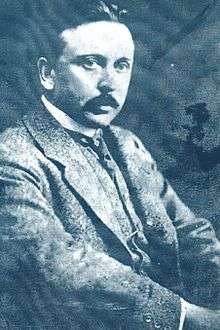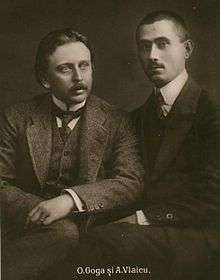Octavian Goga
| Octavian Goga | |
|---|---|
 | |
| Prime Minister of Romania | |
|
In office 28 December 1937 – 10 February 1938 | |
| Monarch | Carol II |
| Preceded by | Gheorghe Tătărescu |
| Succeeded by | Miron Cristea |
| Personal details | |
| Born |
1 April 1881 Rășinari, Austria-Hungary |
| Died |
7 May 1938 (aged 57) Ciucea, Romania |
| Nationality | Romanian |
| Political party |
Romanian National Party People's Party National Agrarian Party National Christian Party |
| Spouse(s) | 1906-1920: Hortensia (b. Cosma) (first wife); 1921-1938: Veturia (b. Mureșan) (second wife) |
| Profession | poet, journalist |
| Religion | Romanian Orthodox |
| Signature |
 |
Octavian Goga (Romanian pronunciation: [oktaviˈan ˈɡoɡa]; 1 April 1881 – 7 May 1938) was a Romanian politician, poet, playwright, journalist, and translator.
Life and politics
Goga was born in Rășinari, near Sibiu.[1]

Goga was an active member in the Romanian nationalistic movement in Transylvania and of its leading group, the Romanian National Party (PNR) in Austro-Hungary. Before World War I, Goga was arrested by the Hungarian authorities. At various intervals before the union of Romania and Transylvania in 1918, Goga took refuge in Romania, becoming active in literary and political circles. Because of his political activity in Romania, the Hungarian state sentenced him to death in absentia.
During World War I, he joined the Romanian Army and took part as a soldier in the Dobruja campaign.
In the interwar period he left the PNR to join General Alexandru Averescu's People's Party (PP), a populist movement created upon the war's end.
Goga clashed with Averescu over the latter's conflict with King Carol II. A founder of the minor PP splinter group naming itself the National Agrarian Party, he led it into an alliance with A. C. Cuza's National-Christian Defense League, forming the National Christian Party.
Goga became Prime Minister of Romania and served from 28 December 1937 to 10 February 1938. He had been appointed by King Carol, in his attempt to increase his own power. Indeed, Carol wrote in his diary that he knew Goga was a human cipher, and hoped that once his government collapsed, it would free him to seize power for himself.[2]
Very early in its tenure, Goga's government introduced a series of anti-Semitic laws.[3] On 12 January 1938 his government stripped Romanian Jews of their citizenship. Besides being an anti-Semite himself, Goga attempted to outflank the Iron Guard's popular support.
| “ | The Jewish problem is an old one here, and it is a Rumanian tragedy. Briefly, we have far too many Jews.[4] | ” |
| “ | For us there is only one final solution of the Jewish problem—the collection of all Jews into a region that is still uninhabited, and the foundation there of a Jewish nation. And the further away the better.[5] | ” |
The regime instituted by Goga and Cuza gave itself a paramilitary wing of Fascist character, the Lăncieri ("Lance-bearers"). They borrowed heavily from the Iron Guard, and started competing with it for public attention.
After his resignation, Goga withdrew to his estate in Transylvania, where he suffered a stroke on 5 May 1938. He died two days later.
Writings
Poetry
- Cărbunii ("The Pieces of Coal")
- Rugăciune ("A Prayer")
- Plugarii ("The Ploughmen")
- Oltul ("The Olt River")
- Din larg ("From the High Seas")
- Profetul ("The Prophet")
- Ceahlăul ("The Ceahlău")
- O ramură întârziată ("A Tardy Branch")
- Trecutul ("The Past")
- Apus ("Sunset")
- Mare eternă ("The Eternal Sea")
- În mine câteodată ("At Times within Me")
Plays
- Domnul notar ("Mr. Notary")
- Meşterul Manole (see Meşterul Manole)
Other
In addition, Goga is known as the translator of works by Sándor Petőfi, Endre Ady, and Imre Madách.
| Romanian Wikisource has original text related to this article: |
References
- ↑ MacGregor-Hastie, Roy (1969). Anthology of contemporary Romanian poetry. Owen. p. 36.
- ↑ Haynes, Rebecca "Reluctant Allies? Iuliu Maniu and Corneliu Zelea Codreanu against King Carol II of Romania" pages 105-134 from The Slavonic and East European Review, Volume 85, Issue # 1, January 2007 page 121.
- ↑ Quinlan, Paul D. (1977). Clash over Romania: British and American policies toward Romania, 1938-1947. American Romanian Academy of Arts and Sciences. p. 29.
- ↑ "Bloodsucker of the Villages". TIME Magazine. 31 January 1938.
- ↑ "Jews Spurned in Rumania". The Argus. Independent Cable Service. 24 January 1938. p. 9.
